How to Deal with Christmas if You Have an Eating Disorder


Reviewed and approved by the psychologist Elena Sanz
Christmas can be a difficult holiday for those with an eating disorder. Since these holidays revolve around large amounts of food and family gatherings, many of these people experience increased levels of anxiety, guilt, and feelings of loneliness.
Whether it’s bulimia, anorexia nervosa, binge-eating disorder or restrictive eating disorder, there’s a high risk of experiencing crises and complications due to changes in routines at this time of year. Therefore, in this article, we’re going to share a series of recommendations to face them.
Tips to face Christmas if you suffer from an eating disorder
Eating behavior disorders are characterized by an alteration in eating patterns, often derived from an excessive concern for body weight and image.
They can manifest themselves through an extreme restriction in food intake or, on the contrary, an excessive consumption of food. They’re categorized as psychiatric problems and, in fact, are found in the fifth edition of the Diagnostic and Statistical Manual of Mental Disorders (DSM-5).
The most frequent types are:
- Anorexia nervosa
- Bulimia nervosa
- Binge-eating disorder
- Food avoidance or restriction disorder
Other disorders included in the DSM-5 are other specified and unspecified eating disorders.
A publication in the Internal Medicine Journal states that the prevalence of these disorders is higher among women and young people. However, men are not exempt, not are people of all ages.
Due to the complexity of these disorders and the constant risk of relapse, Christmas is a difficult time for affected patients. Pressure to eat more than usual, increased socialization, stress due to lack of time, and disruption of routines become triggers for crises.
It must be taken into account that it’s extremely difficult for a person with an eating disorder to establish a good relationship with food. Hence, the fact that their anxiety and worry about the type and amount of food usually eaten at Christmas celebrations increases.
How to deal with it
How do you help a family member with an eating disorder who’s not having such a good time at Christmas? Mainly, it’s necessary to make sure that their medical and psychological approach is respected. The fact that we are going through dates of celebrations is not a reason to suspend or postpone treatments.
In addition to this, it’s possible to implement a series of strategies that not only help to reduce the symptoms of anxiety, but are decisive to avoid crises and complications. Let’s see the most relevant ones.

Find out: How to Enjoy an Inclusive Christmas
Plan activities in advance
Without a doubt, planning activities at Christmas is one of the main keys to avoid relapses in case of having an eating disorder. It’s necessary to break with the idea that celebrations go hand-in-hand with excesses.
If you or a family member suffers from an eating disorder, it’s a good idea to choose pleasant plans that allow distraction and enjoyment but that are not centered on food. Family games, decorating the house, singing Christmas carols, watching a movie, doing karaoke, going out to see the lights or dancing are some of the options.
Planning meals
Of course, what has to do with meal planning deserves a special mention. Since the problem of a person with an eating disorder is his or her relationship with food, Christmas menus must be carefully prepared.
In this sense, we must change our chips a little and leave behind the idea that celebrations should be made with varied and abundant dishes on the table. It should not be ignored that the person may be tempted to eat exaggerated portions, or may feel overwhelmed by seeing so much food.
Therefore, the key is to implement the following recommendations:
- Remove the person from the meal preparations. It’s not necessary for him/her to participate in shopping or dinner preparation. This prevents their anxiety from being triggered earlier.
- Base the menu on fresh and healthy foods. Avoid large meals, as they can generate a feeling of guilt.
- Avoid buffet meals. Having too many meals available can trigger anxiety or distress.
- Serve the appetizer first, then the main course and, finally, the dessert.
- Try to keep the portions the same for everyone at the table. This normalizes the moment and can give peace of mind to the person with the eating disorder.
- Do not insist on overeating. No matter how delicious a meal may be, respect the process of the person with an eating disorder. Pressuring or making comments about what or how much they should eat tends to hinder treatment.
Implement relaxation or distraction techniques
Food-related issues are not the only trigger of anxiety at Christmas for someone with an eating disorder. Social gatherings, working hours, economic difficulties, among other factors, can trigger anxiety in these patients and aggravate their symptoms.
To counteract this, a good option is to implement relaxation techniques during the day. Listening to music, doing breathing exercises, having an aromatherapy session, taking a walk or practicing yoga is quite beneficial.
Prioritizing self-care is important when you have an eating disorder
It’s true that Christmas celebrations imply changes in routine. But when suffering from an eating disorder, this should not mean a sacrifice of well-being. In fact, taking advantage of the time off from the Christmas vacations or the holidays, it is healthy to do self-care activities.
Some interesting options are the following:
- Meditate.
- Get a good night’s sleep.
- Read a book.
- Take a bath in the tub.
- Put on a face mask.
- Do physical activity (as long as the specialist approves it).
Taking care of the holiday language
Family and social support plays an important role in the recovery of a person with eating disorders. For this, it’s essential to learn to take care of your language, especially when there is some kind of meeting or celebration.
It’s not appropriate to make “joking” comments or categorize food as something that’s either good or bad. If the person decides to eat less or chooses foods different from those of the family dinner, it’s not necessary to give an opinion. What for some may be a simple joke, for the sick person may be a source of dissatisfaction and discomfort.
Similarly, if there are guests, try to inform them before proceeding to dinner and sharing. The idea is to avoid questions or comments related to food, physical appearance or any other issue associated with the disorder.

Other useful strategies to face an eating disorder at Christmas
- Understand and accept your emotions. People associate Christmas with happiness, but it’s not wrong to feel sad or anxious. There’s no obligation to be cheerful or excited.
- If the person is at risk for compensatory behaviors, they can have someone to support them for times when they want to go to the bathroom.
- Keep your opinions about a person’s physique to yourself. This is a good habit not only with regard to the person concerned, but for anyone.
- Also, avoid compliments based on aesthetic references. Instead, a supportive message such as “you are very brave”, “I admire you”, “I am proud” can be offered.
- When giving gifts, avoid things that may generate sensitivity. For example, in these cases, it’s not such a good idea to give clothes as a gift because of the size issue. How about giving an experience instead? It can be a trip, a spa day, a visit to museums… there are countless different options.
Do you know what are The 7 Most Common Causes of Stress at Christmas Time?
Family and environmental support is key for people with an eating disorder
Understanding the difficulties of the Christmas season for people with an eating disorder is key to fostering empathy. So is a support network. Both the family and other people in the environment can help generate a more suitable environment to avoid relapses.
Keep in mind that these dates trigger anxiety in these patients; not only because of what is related to the issue of meals, but also because of the social pressure and the fact of wanting to meet the expectations of joy and enthusiasm. Therefore, accompanying, avoiding unnecessary comments and planning a different holiday are all crucial. These help reduce the feeling of worry and guilt that is often exacerbate during this season.
All cited sources were thoroughly reviewed by our team to ensure their quality, reliability, currency, and validity. The bibliography of this article was considered reliable and of academic or scientific accuracy.
- Balasundaram P, Santhanam P. Eating Disorders. [Updated 2022 Sep 3]. In: StatPearls [Internet]. Treasure Island (FL): StatPearls Publishing; 2022 Jan-. Available from: https://www.ncbi.nlm.nih.gov/books/NBK567717/
- Hay P. Current approach to eating disorders: a clinical update. Intern Med J. 2020 Jan;50(1):24-29. doi: 10.1111/imj.14691. PMID: 31943622; PMCID: PMC7003934.
- Davis LE, Attia E. Recent advances in therapies for eating disorders. F1000Res. 2019 Sep 26;8:F1000 Faculty Rev-1693. doi: 10.12688/f1000research.19847.1. PMID: 31598212; PMCID: PMC6764116.
- Barati F, Nasiri A, Akbari N, Sharifzadeh G. The Effect of Aromatherapy on Anxiety in Patients. Nephrourol Mon. 2016 Jul 31;8(5):e38347. doi: 10.5812/numonthly.38347. PMID: 27878109; PMCID: PMC5111093.
- Ostermann, T., Vogel, H., Boehm, K., & Cramer, H. (2019). Effects of yoga on eating disorders—A systematic review. In Complementary Therapies in Medicine (Vol. 46, pp. 73–80). Elsevier BV. https://doi.org/10.1016/j.ctim.2019.07.021
This text is provided for informational purposes only and does not replace consultation with a professional. If in doubt, consult your specialist.








